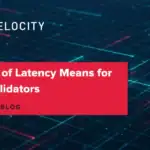The promise of Web3 is decentralization—a network where no single entity holds the reins. Yet a closer look at the infrastructure supporting blockchain networks reveals an uncomfortable truth: much of this “decentralized” ecosystem runs on a handful of centralized cloud platforms.
When Hetzner abruptly blocked Solana validators in November 2022, over 1,000 nodes went offline. Validator operators scrambled to migrate their infrastructure, facing downtime, penalties, and lost staking rewards. The incident wasn’t an isolated misstep. It exposed a structural vulnerability baked into how Web3 deploys its infrastructure—one that continues to threaten network stability, operator livelihoods, and the very principle of decentralization.
This is the cloud TOS problem: the gap between blockchain’s decentralized aspirations and the centralized platforms that host its nodes. Understanding how cloud provider Terms of Service (TOS) and Acceptable Use Policies (AUP) restrict crypto operations is critical for anyone running or planning to run validator nodes.
The Centralization Paradox
Blockchain networks depend on distributed nodes to validate transactions and secure the network. In theory, these nodes should be spread across diverse infrastructure to prevent single points of failure. In practice, operators gravitate toward the convenience and scalability of major cloud providers—AWS, Google Cloud, Microsoft Azure, and others.
Before Hetzner’s policy clarification, roughly 10% of all Ethereum nodes ran on its servers. Coinbase distributes its Ethereum validators across just two platforms: AWS and GCP. This concentration creates systemic risk. If a single provider changes its policy, enforces restrictions, or suffers an outage, entire swaths of a blockchain network can go dark.
The Hetzner incident proved this isn’t a hypothetical concern. When the provider enforced its TOS against cryptocurrency operations, Solana’s network lost a significant portion of its validator infrastructure overnight. Operators faced slashing penalties, reputation damage, and immediate financial loss—not because of technical failure, but because of policy enforcement.
Understanding the Cloud TOS Problem
Cloud providers outline what users can and cannot do through their Terms of Service and Acceptable Use Policies. These documents govern everything from resource consumption to legal compliance. For crypto operators, the fine print often contains restrictions that directly impact mining, staking, and node operations.
What Major Providers Prohibit
Hetzner states that “the operation of applications for mining crypto currencies is prohibited.” Support staff have clarified this ban extends to all cryptocurrency-related activities, including Proof-of-Stake (PoS) validation and node hosting. The policy is enforced broadly, leaving no room for interpretation.
DigitalOcean explicitly prohibits “Mining of any cryptocurrency…without explicit written permission.” While the language focuses on mining, operators must request approval even for staking or running non-mining nodes—an extra layer of bureaucracy that introduces uncertainty.
AWS Free Tier forbids cryptocurrency mining outright. The broader AWS Service Terms give the company wide latitude to remove “Prohibited Content” or suspend services for activities that “violate the law, infringe or misappropriate the rights of any third party, or otherwise violate a material term of the Agreement.”
Google Cloud Platform (GCP) requires prior approval for cryptocurrency mining but offers more nuance. Its support documentation clarifies that “blockchain activities not resource-intensive, such as PoS, do not require verification.” This distinction matters—PoS validators consume fewer resources than PoW miners—but the policy still leaves operators in a gray zone.
Microsoft Azure bans users from engaging in “crypto-currency mining…and/or any use that could cause harm to Microsoft or others.” The vague language around “harm” gives Azure broad discretion in enforcement.
Oracle Cloud prohibits “cyber/crypto mining” entirely, with no exceptions or clarifications for PoS operations.
Why Providers Restrict Crypto Operations
Cloud platforms enforce these restrictions for several reasons:
Resource strain: PoW mining demands extreme CPU and GPU usage. Even PoS validation can cause high I/O load, particularly for networks like Solana. Heavy usage degrades hardware and affects other customers sharing the same infrastructure.
Cost and financial risk: Cryptocurrency operations often generate massive cloud bills. Providers worry about unpaid invoices, credit card fraud, and customers who rack up charges they can’t cover.
Security abuse: Hacked cloud accounts are frequently used for illicit mining (cryptojacking). Banning mining reduces this attack vector and limits the damage from compromised credentials.
Regulatory compliance: Providers operate under laws that govern financial transactions, sanctions, and money laundering. Hosting crypto operations introduces regulatory scrutiny they’d rather avoid.
Real-World Impacts and Risks
Violating a cloud provider’s TOS carries serious consequences. Operators who ignore these policies—or fail to understand them—face risks that extend far beyond a suspended account.
Network Stability
When a cloud provider bans validators en masse, the blockchain network suffers. The Hetzner incident reduced Solana’s validator count by over 1,000 nodes in a single sweep. Sudden drops in network participation degrade performance, increase latency, and reduce fault tolerance. For networks with high validator requirements, mass exits can threaten consensus itself.
Financial Losses
Validator downtime translates directly to lost rewards. Staking protocols penalize offline validators through slashing—burning a portion of staked capital as punishment for inactivity or poor performance. Operators who lose access to their cloud infrastructure face both missed rewards and potential slashing penalties, compounding their losses.
Running a validator on public cloud infrastructure can cost 5 to 10 times more annually than an equivalent bare metal setup. When that expensive cloud instance is suddenly suspended, operators lose their investment without recourse.
Legal and Compliance Concerns
Violating a cloud provider’s TOS can trigger legal liability. If an operator signs a contract agreeing not to mine or stake, then proceeds to do so anyway, they’ve breached the agreement. Providers can pursue damages, and operators may face account bans across multiple platforms.
Regulatory scrutiny adds another layer of risk. Governments worldwide are tightening oversight of cryptocurrency operations. Running a validator on a platform that doesn’t permit it could expose operators to both civil and criminal liability, depending on jurisdiction.
Solutions and Alternatives
The cloud TOS problem isn’t insurmountable. Operators have options—they just need to understand the trade-offs and act proactively.
Decentralized Cloud Alternatives
Decentralized cloud platforms like Akash Network, Flux, and Filebase offer blockchain-native infrastructure designed explicitly for Web3 workloads. These platforms distribute resources across a network of independent providers, reducing reliance on any single entity. They also tend to be more permissive regarding crypto operations, since they’re built by and for the crypto community.
The downside: decentralized clouds are still maturing. They may lack the uptime guarantees, global reach, and enterprise-grade support that established providers offer. For high-stakes validator operations, this trade-off requires careful consideration.
Crypto-Friendly Hosting Providers
Several traditional hosting companies explicitly welcome cryptocurrency operations. Contabo permits PoW mining on dedicated servers and fully supports PoS staking. These providers understand the needs of crypto operators and tailor their policies accordingly.
For Solana validators specifically, Hivelocity offers a purpose-built solution. Its Solana Server lineup delivers high-performance bare metal infrastructure optimized for the network’s demanding requirements. Key benefits include:
- Pre-configured, validator-ready servers: No need to spend hours tuning hardware specs. Hivelocity’s configurations meet and exceed Solana’s performance benchmarks out of the box.
- Enterprise-grade uptime: A 99.99% SLA ensures your validator stays online, reducing the risk of slashing and missed rewards.
- Global footprint: Over 50 data center locations worldwide let you select the optimal latency and connectivity for your specific needs.
- 24/7/365 expert support: When issues arise, Hivelocity’s team responds immediately with deep technical expertise.
- Flexible billing: Month-to-month contracts mean no long-term commitment—scale your operations as your staking capital grows.
- Robust DDoS protection: Built-in defenses mitigate attacks before they impact your validator.
Hivelocity’s Solana Servers start at $289/month for a configuration featuring an AMD EPYC 7313P (16 cores, 32 threads), 256GB RAM, 2TB NVMe SSD + 1TB NVMe SSD, and 20TB bandwidth on a 10Gbps port. For operators requiring more power, the AMD EPYC 7413 configuration offers 24 cores, 48 threads, and similar storage for $299/month.
Migrating Off Big Cloud Providers
If you’re currently running validators on AWS, GCP, or Azure, migrating to crypto-friendly hosting is a strategic move. Here’s how to approach it:
- Audit your current setup: Document your server specs, networking configuration, and dependencies. Understand what you’re running and what you need to replicate.
- Choose a crypto-friendly provider: Research options that explicitly permit staking and node operations. Check their TOS and AUP to confirm.
- Test before you switch: Spin up a test validator on the new provider. Verify performance, uptime, and connectivity before committing.
- Plan your migration window: Schedule downtime during low-activity periods to minimize slashing risk. Coordinate with your staking pool or delegation partners if applicable.
- Monitor post-migration: Track performance metrics closely after the switch. Ensure latency, uptime, and reward rates meet expectations.
Complying with Cloud TOS
If you choose to remain on a major cloud provider, compliance is non-negotiable. Here’s how to stay within the rules:
- Read the fine print: Download and review your provider’s TOS and AUP. Don’t assume—verify what’s allowed.
- Request approval in writing: If the TOS requires permission, obtain it before deploying. Save all correspondence.
- Use dedicated resources: Avoid shared environments like Free Tier or VPS plans. Opt for dedicated instances or bare metal to reduce resource contention.
- Monitor usage: Track CPU, memory, and I/O to ensure you’re not triggering abuse detection systems.
- Maintain documentation: Keep records of your operations, communications with the provider, and compliance efforts.
Securing Your Validator Infrastructure
The cloud TOS problem isn’t just a technical issue—it’s a strategic one. As blockchain networks mature, the infrastructure supporting them must evolve beyond centralized dependencies. Relying on a handful of Web2 giants contradicts the foundational principles of decentralization and exposes operators to systemic risks.
Understanding cloud provider policies is the first step. Migrating to crypto-friendly hosting is the next. For Solana validators, Hivelocity offers a clear path forward: high-performance bare metal servers, enterprise-grade uptime, and expert support designed specifically for the demands of PoS validation.
The future of Web3 depends on resilient, decentralized infrastructure. By taking proactive steps now—diversifying hosting, understanding TOS restrictions, and choosing providers that align with blockchain principles—you can protect your validator, secure your rewards, and contribute to a more robust network.
Ready to move your Solana validator to infrastructure built for decentralization? Explore Hivelocity’s Solana Servers and discover how bare metal performance, global reach, and 24/7 support can elevate your validation operation.


